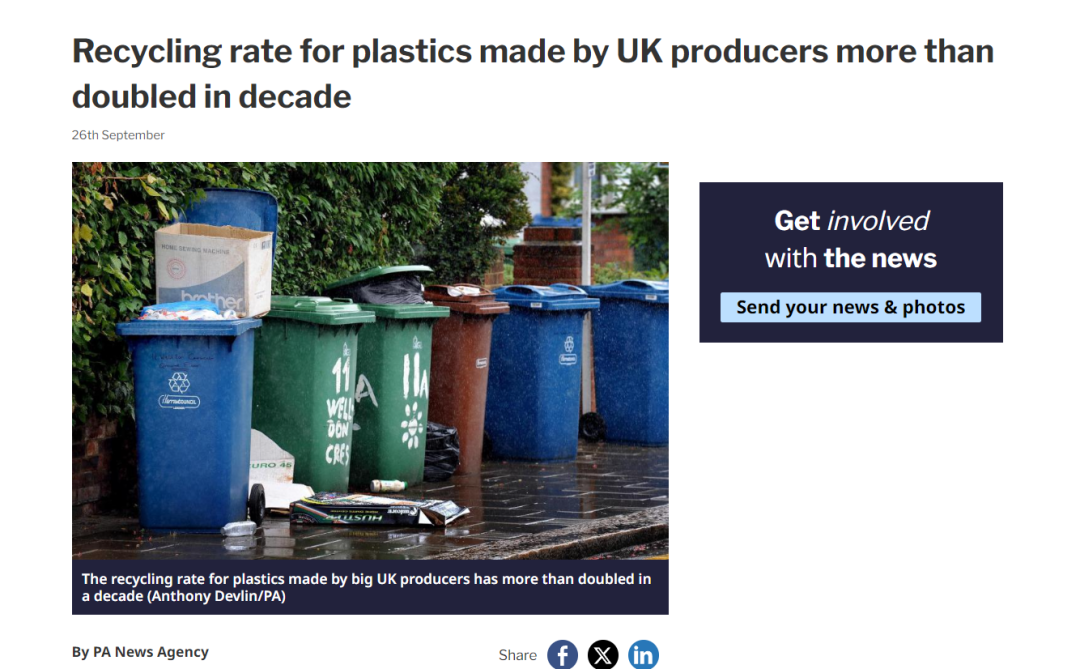 48
48

The significant progress in plastic recycling in the UK is closely related to the rise of environmentalism worldwide. In the past decade, society's attention to plastic production and its impact on the environment and health has significantly increased, prompting governments and private enterprises to take more measures to address this issue. In this process, the promotion of policies played a key role, especially for enterprises that process more than 50 tons of plastic packaging waste annually and have an annual turnover of over 2 million pounds, requiring them to ensure a certain proportion of plastic recycling in their production.
In addition, besides plastic, the overall recycling rate of all packaging waste has also increased to 64.8% in 2023, including paper, cardboard, glass, metal, and wood waste. Compared to the 62.4% recycling rate in 2022, this growth continues the continuous upward trend since 2014, indicating that the overall waste recycling rate is steadily improving.
However, despite significant progress in plastic recycling, the household waste recycling rate has decreased over the past year. Data shows that in 2022, households in the UK generated 25.7 million tons of waste, of which 11.3 million tons were recycled, with a recycling rate of 44.1%. This figure has decreased compared to 44.6% in 2021, especially in England where the recycling rate has dropped from 44.1% to 43.3%. In contrast, the recycling rates in Northern Ireland, Scotland, and Wales have increased during the same period, reaching 49.2%, 42.1%, and 56.9%, respectively.
With the increasingly severe problem of plastic pollution, the new government has proposed a plan to transform towards a "zero waste economy", aiming to address plastic pollution by increasing recycling rates, attracting private investment, and creating thousands of green jobs. Mary Craig, Minister of Circular Economy, expressed disappointment at the decline in recycling rates and the exacerbation of garbage and littering problems in cities, rural areas, and villages. She further pointed out that future policies will focus on reducing waste generation and promoting more businesses and consumers to participate in the recycling system.
At the same time, environmental organizations are actively calling on the government to take stronger action. Greenpeace UK political activist Rudy Shulgind pointed out, "These data are a wake-up call for the new government. We need a bold new plan focused on reducing waste production." He emphasized the final round of negotiations for the global plastic treaty to be held in November and called for strong global targets to reduce plastic production.
The UK has made significant progress in plastic recycling, but there are still some key challenges that need to be addressed to achieve true sustainable development. Firstly, the production and consumption of plastics remain high globally. According to data, in 2020, the UK generated a total of 19.12 million tons of waste, of which 61% came from construction, demolition, and excavation waste, 21% from commercial and industrial waste, and 14% from household waste.
The continuous increase in plastic production and the existing loopholes in the recycling system, especially in England, means that there is still a lot of room for improvement in the UK's waste management system. Reducing plastic production and promoting a circular economy will be key tasks in achieving environmental goals in the coming years. Policymakers, industry leaders, and consumers all need to work together to establish stronger recycling infrastructure while reducing the use of disposable plastics.
The doubling of plastic recycling rates reflects the UK's proactive efforts in addressing plastic pollution over the past decade. However, with the decline in household recycling rates and the continuous increase in plastic production, the problem of plastic pollution remains severe. In the future, the UK government, private enterprises, and various sectors of society need to further strengthen cooperation and jointly promote the development of circular economy to address this global challenge.


